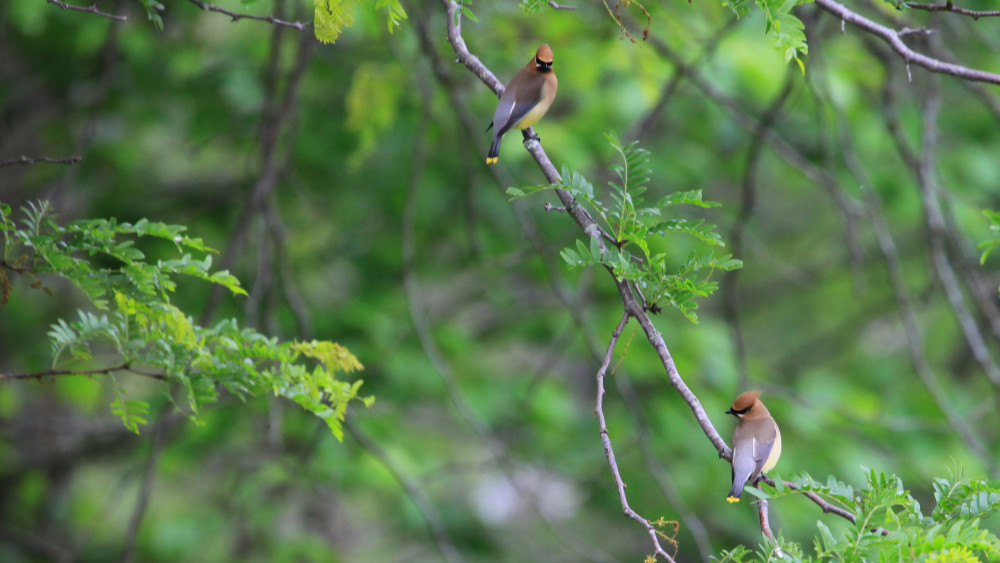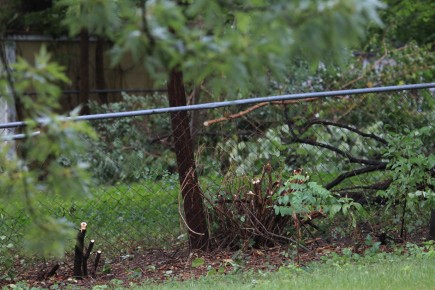A couple of weeks ago, I noticed our neighbors in one of the rental houses nearby moving out. A few days later, the “slumlord” and his merry bunch came in and started gutting the place. They worked long hours and made a lot of noise. I’m on the patio a lot these days, taking pictures, watching the hummers and the many young birds who fledged from our yard or nearby yards. The young birds are busy learning from their parents and getting ready for a long migration or a winter in Kansas. I heard one of the workers at the house more or less say he wasn’t sure how long “X” would last because, “‘Those people’ tear it up.” That’s pretty typical language around Lawrence where slumlords rule. After overhearing bits and pieces of that conversation, I was already a little disgusted, but things got a lot worse.
A few days later, someone new showed up to the rental house. I was on the patio as Slumlord explained to him what trees, shrubs, and vines he could remove from the backyard—pretty much anything he wanted. I immediately felt a bit sick to my stomach. All of the growth in the backyard along the fences not only serves as privacy for several neighbors, but has been home all summer to robins, catbirds, brown thrashers, cardinals, doves, wrens, house finches, sparrows, etc. These areas also provide good cover for the neighborhood rabbits, squirrels, opossums, raccoons, and foxes as they forage, mostly without us every knowing they are there.
The next day when I looked out, it looked like a bomb had gone off over there. While this house is not directly next to us, it is one house over. I was furious. When I get furious, I often go into research mode. I did a little cyber-stalking of Slumlord. I found that he seems to be a well-respected Lawrence resident, a self-identified liberal and “mystic.” His little Taoist post on his Facebook page must only extend to himself, not anyone else around him. He does not live in our neighborhood, so what does he care. I am so over the, “Not in my backyard,” people. There was something about seeing how this guy presents himself that made me even angrier. I am reminded of how many times I’ve heard, “I am not a bigot,” from people who talk about “Illegals” or get defensive when anyone mentions white privilege. Yes, I am generalizing, but our choices as individuals do matter. They matter a great deal.
Tearing all of those shrubs and small trees out served no purpose. Doing so did not improve the look of the yard. It made it look worse. The shrubs and trees were not near the house, so it was not about insect issues. There was really no reason for it at all. Even if they have no regard for the animals who live there, I would imagine the neighbors on each side are not too thrilled with the sudden lack of privacy. More important, since this destruction, I have seen fewer birds. I have not seen the parents of the young cardinal who frequents our yard. I have not seen the juvenile robins. I have not seen the young brown thrasher. I have not seen the young catbirds. Yes, many of these birds are getting ready to migrate and I am thankful that this guy did not start all of this while nesting was going on. However, the question becomes, will they come back to nest next year?
What is the purpose of my little rant? I just want people to stop and think. I imagine this guy going through life with his head completely lodged in his ass, imagining himself benevolent, kind, perhaps even compassionate. Yet, in a couple of days, he completely destroyed the homes of several species. Yes, nesting season is pretty much over, but what about the space they once had. Will he let it grow back? It’s not as if the birds can just move over to another space. Beings are in those spaces. These spaces are rare. Whether it is the wooded areas destroyed for more needless development, or the rare urban spaces like ours, habitat loss is a serious issue.
According to the U.S. Wildlife Service, “Nearly one-third of the more than 800 bird species in the United States are endangered, threatened, or in decline due to climate change, habitat loss, and invasive species” (2009). If the USFWS is saying this, we can assume the problem is much worse. The National Audubon Society (who probably also have conservative numbers) notes, “Species on their list of Common Birds in Decline have seen their populations plummet at least 54 percent since 1967” (2010). A big factor in this decline—habitat loss.
Just about every organization recommends individuals make a difference by growing native plants and doing everything possible to create friendly habitats within their yards. It’s pretty easy to do. Provide clean water, a brush pile, grow native plants and flowers. This is all very low maintenance and relatively inexpensive. Don’t be a slumlord and we’ll have a great place to live.
Create a Bird-friendly Habitat
Kansas Native Plants
http://www.kansasnativeplants.com/
Kansas Wildflowers and Grasses


He is still at it. Now he has a chain saw.